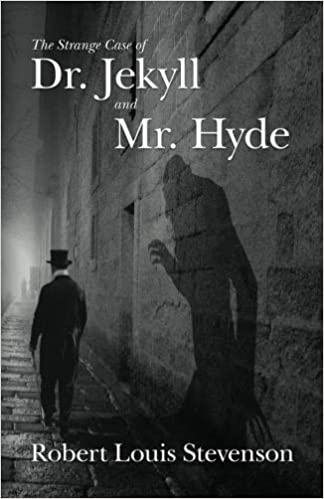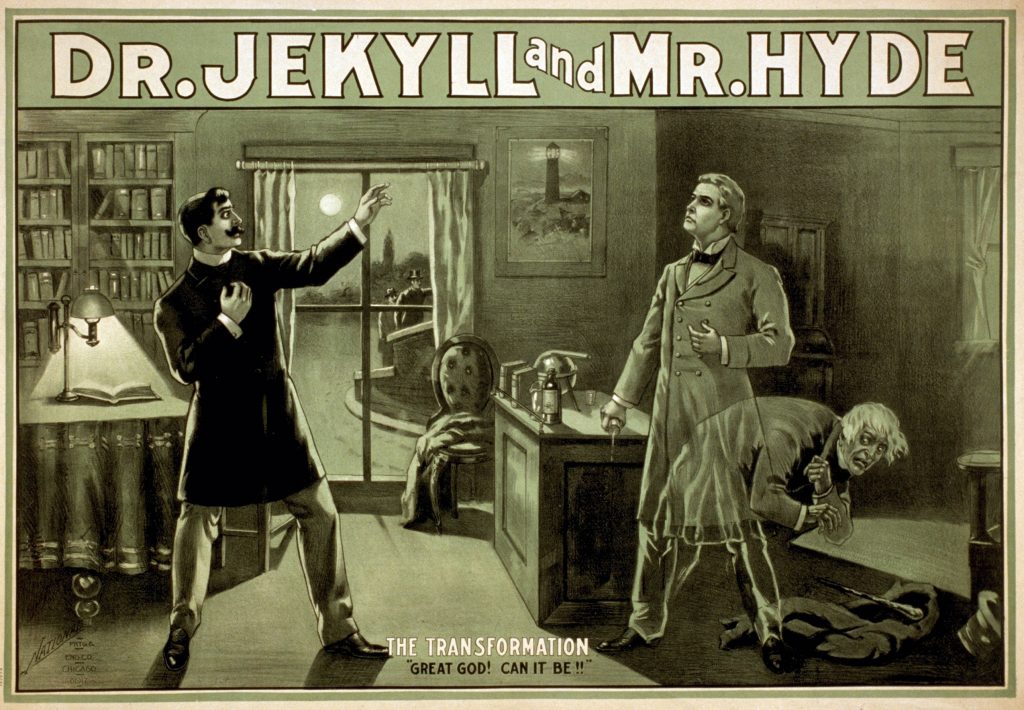This is the second in the series of free English lessons designed to get you and your teenagers discussing books. This week we will be looking at the 19th-century novel Jekyll and Hyde. This is probably the most popular 19th-century novel chosen by schools for GCSE and IGCSE. It is on the English Literature syllabus for AQA, OCR, Edexcel, WJEC/Eduqas and Cambridge (CAIE) exam boards. Studying a 19th-century novel for GCSE is mandatory for the English boards and therefore an excellent choice for reading and discussion with your teenagers.
Any book discussion on a 19th-century novel will be valuable home study for teenagers and will allow you an insight into what they will be doing when they return to school. Even if you have an older child who is not yet doing GCSE, you can still help them to read more widely, understand English better, and stimulate some discussion. I’ve put in some questions for you as a starting point, some research tasks, and I have included the free pdf downloads too.
The Strange Case Of Dr. Jekyll And Mr. Hyde by Robert Louis Stevenson
Download the Book
Background to the Book
Stevenson’s most famous book, The Strange Case of Dr Jekyll and Mr Hyde, was written as a Gothic story for the Christmas market. He wrote the book in six weeks in the autumn of 1885, the result, he claimed, of a fevered nightmare he suffered while recuperating from illness. The short book did not appear until January 1886 because Stevenson’s wife was shocked by the first version and insisted he burn the manuscript and rewrite it. Reference and learn more
The Lesson
Read the book. Watch the video clip. Then discuss the book together. Whilst you want to hear ideas and personal responses, try to keep a loose framework to the discussion. Here are some ideas of relevant questions to ask. These are, by the way, exactly the sort of questions your child will need to know the answers to if they have this book to study at school. A good way to study books is to move chapter by chapter, so you can choose that approach if you prefer.
How to Analyse a Novel Part 1
Chapter One: STORY OF THE DOOR
What do you think of the characters of Enfield and Utterson? What are their main characteristics? How might this reflect aspects of Victorian society?
Is it fair to say that Utterson is a logical and rational man? Find examples in the text as evidence.
Research Victorian society on the internet. Can you find evidence of a rational, logical point of view amongst Victorians? Can you also find evidence of belief in the supernatural? How do you think Jekyll and Hyde might reflect these dual aspects of Victorian society?
Chapter Two: SEARCH FOR MR. HYDE
Why does Mr Utterson become so worried about Dr Jekyll?
It has been said that Jekyll and Hyde has many characteristics of a detective story. Do you agree? Why/why not?
Stevenson uses the device of dreams in this chapter? What is the effect of this?
Chapter Three: DR. JEKYLL WAS QUITE AT EASE
How is Dr Jekyll presented in this chapter?
Chapter Four: THE CAREW MURDER CASE
Stevenson describes the foggy weather in this chapter? How is his description of the weather adding to the mood/atmosphere of the narrative?
Note also that Stevenson is describing the full moon – why might he have set the scene under a full moon?

How to Analyse a Novel Part 2
Chapter Five: INCIDENT OF THE LETTER
Throughout the narrative so far we have followed Utterson, not Jekyll, and we understand the developing situation from Utterson’s perspective. Does this make a difference to the way the story is told? How different might it be if we heard the story from Jekyll’s perspective?
Chapter Six: INCIDENT OF DR. LANYON
How does Stevenson create a sense of mystery in this chapter?
Chapter Seven: INCIDENT AT THE WINDOW
What exactly do you think the men have seen at the window? Stevenson doesn’t tell us exactly what they have seen – why do you think this is?
Free English Lessons – American Classics
Chapter Eight:THE LAST NIGHT
The narrative moves forward in this chapter at some speed (once Utterson is persuaded of the serious state of affairs). Write a summary of the series of events.
Chapter Nine: DR. LANYON’S NARRATIVE
Finally the reader discovers the secret! How does Stevenson create tension as the secret is revealed? What is Dr. Lanyon’s reaction?
There is a significant use of descriptive language in this chapter, especially in the description of Hyde, the potion, and the effect of the potion. Can you say how this is effective? How does Stevenson bring this important scene alive for us?
How to Study Gothic Literature
Chapter Ten: HENRY JEKYLL’S FULL STATEMENT OF THE CASE
Why do you think Jekyll emphasises his good background?
The book has a theme of the duality of human nature. It conveys the idea of good versus evil inside one human body. How does Stevenson show this? Do you think he is showing us that humankind is equally good and evil? Or is there more good than evil in us? Consider that Hyde is physically smaller than Jekyll – does this matter?
How do you feel about the ending?
Do you feel empathy for any of the characters? Who? Why?
Secrecy is a theme throughout the book. Even the fog creates a sense of secrecy in Victorian London. Why do you think Stevenson uses the theme of secrecy?
Research – Use the internet to find out more about Robert Louis Stevenson
A Bit About Me

As well as being a mum, grandmother, practising tutor, historian and education blogger, I am the Founder & Managing Partner of The Tutor Team. We are a family business, where I work with both my daughter Tess and my son Anthony. I am also assisted by Lisa, my PA. We are proud to have a team of 64 qualified, experienced teachers and university lecturers offering high-quality private tuition online.
During the lockdown I’m going to offer you are series of free lessons to help whilst all our children are at home. The next in the series will be the 3rd 19th-century novel (another popular choice by schools) Great Expectations. Another classic for you to read and discuss with your family.
Dr Janet Rose
Do you need a qualified, experienced English Tutor to help your children study?


